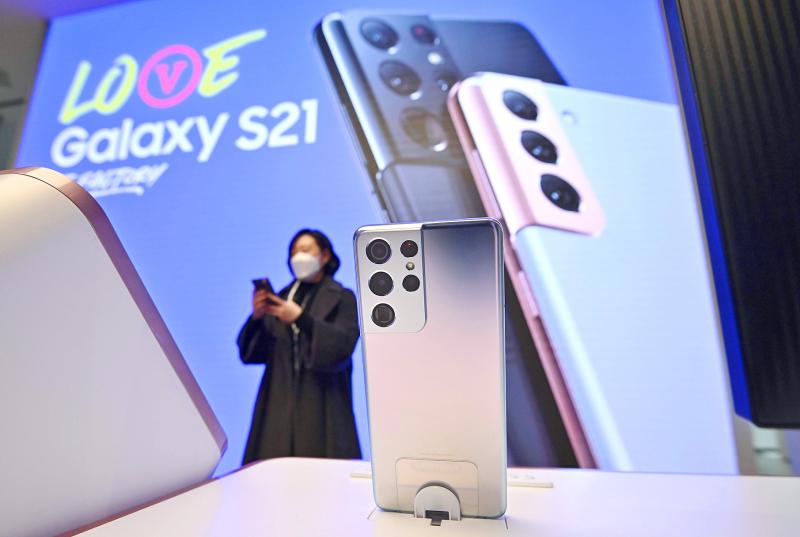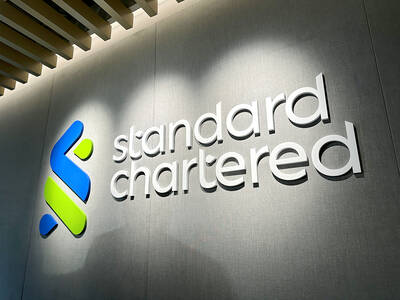Samsung Electronics Co is considering spending more than US$10 billion building its most advanced logic chipmaking plant in the US, a major investment that it hopes would win more US clients and help it catch up with industry leader Taiwan Semiconductor Manufacturing Co (TSMC, 台積電).
The world’s largest memorychip and smartphone maker is in discussions to locate a facility in Austin, Texas, capable of fabricating chips as advanced as 3 nanometers, people familiar with the matter said.
Plans are preliminary and subject to change, but for now the aim is to start construction this year, install major equipment from next year, then begin operations as early as 2023, they said.

Photo: AFP
While the investment amount could fluctuate, Samsung’s plans would mean upward of US$10 billion to bankroll the project, one of the people said.
Samsung is taking advantage of a concerted US government effort to counter China’s rising economic prowess and lure back home some of the advanced manufacturing that over the past decades has gravitated toward Asia.
The hope is that such production bases in the US would galvanize local businesses and support US industry and chip design.
Intel Corp’s troubles ramping up on technology and its potential reliance on TSMC and Samsung for chipmaking only underscored the extent to which Asian giants have forged ahead in the past few years.
The envisioned plant would be its first to use extreme ultraviolet (EUV) lithography, the standard for next-generation silicon, in the US, the people said, asking not to be identified talking about internal deliberations.
If Samsung goes ahead, it would effectively go head-to-head on US soil with TSMC, which is on track to build its own US$12 billion chip plant in Arizona by 2024.
Samsung is trying to catch TSMC in the so-called foundry business of making chips for the world’s corporations — a particularly pivotal capability given a deepening shortage of semiconductors in the past few weeks.
Under Samsung family scion Jay Y. Lee, the company has said it wants to be the biggest player in the US$400 billion chip industry.
It plans to invest US$116 billion into its foundry and chip design businesses over the next decade, aiming to catch TSMC by offering chips made using 3 nanometer technology from next year.
It already dominates the market for memory chips and is trying to increase its presence in the more profitable market for logic devices, such as the processors that run smartphones and computers.
It already counts Qualcomm Inc and Nvidia Corp as customers, companies that historically relied on TSMC exclusively.
It has two EUV plants, one near its main chip site in Hwaseong, South Korea, and another coming online nearby at Pyeongtaek.
To close a deal, Samsung might need time to negotiate potential incentives with US President Joe Biden’s administration.
The company has hired people in Washington to lobby on behalf of the deal and is ready to go ahead with the new administration in place, the people said.
Tax benefits and subsidies would ease Samsung’s financial burden, but the company might go ahead even without major incentives, one of the people said.
Samsung has been looking into overseas chipmaking for years. Intensifying trade tensions between the US and China and now the COVID-19 pandemic are stoking uncertainty over the reliability and economics of the global supply chain.
Plants in the US could help the South Korean chipmaker strike better deals with key clients in the US, particularly in competition with TSMC.
From Microsoft Corp to Amazon.com Inc and Google, the world’s largest cloud computing firms are increasingly designing their own silicon, aiming to tailor chips to power their vast data centers more efficiently.
All of them need manufacturers such as TSMC or Samsung to turn their blueprints into reality.

South Korea’s equity benchmark yesterday crossed a new milestone just a month after surpassing the once-unthinkable 5,000 mark as surging global memory demand powers the country’s biggest chipmakers. The KOSPI advanced as much as 2.6 percent to a record 6,123, with Samsung Electronics Co and SK Hynix Inc each gaining more than 2 percent. With the benchmark now up 45 percent this year, South Korea’s stock market capitalization has also moved past France’s, following last month’s overtaking of Germany’s. Long overlooked by foreign funds, despite being undervalued, South Korean stocks have now emerged as clear winners in the global market. The so-called “artificial intelligence

Chinese artificial intelligence (AI) start-up DeepSeek’s (深度求索) latest AI model, set to be released as soon as next week, was trained on Nvidia Corp’s most advanced AI chip, the Blackwell, a senior official of US President Donald Trump’s administration said on Monday, in what could represent a violation of US export controls. The US believes DeepSeek will remove the technical indicators that might reveal its use of American AI chips, the official said, adding that the Blackwells are likely clustered at its data center in Inner Mongolia, an autonomous region of China. The person declined to say how the US government received

FORTUNES REVERSED: The new 15 percent levies left countries with a 10 percent tariff worse off and stripped away the advantage of those with a 15 percent rate In a swift reversal of fortunes, countries that had been hardest hit by US President Donald Trump’s tariffs have emerged as the biggest winners from the US Supreme Court’s decision to strike down his emergency levies. China, India and Brazil are among those now seeing lower tariff rates for shipments to the US after the court ruled Trump’s use of the International Emergency Economic Powers Act to impose duties was illegal. While Trump subsequently announced plans for a 15 percent global rate, Bloomberg Economics said that would mean an average effective tariff rate of about 12 percent — the lowest since

Standard Chartered Bank Taiwan’s newly appointed chief executive officer, Anthony Yu (游天立), yesterday unveiled an ambitious growth strategy for the bank’s wealth management division, reflecting a bullish outlook on Taiwan’s high-net-worth market. Yu, the first local executive to lead Standard Chartered Bank’s Taiwan operations, emphasized rising client demand and detailed plans to expand the bank’s digital capabilities, as well as its physical presence across the country. Standard Chartered Taiwan saw a remarkable surge in new wealth management clients last month, with the number of clients holding assets equivalent to US$1 million more than doubling compared with the same month last year, he